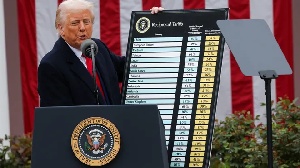Business News of Friday, 4 April 2025
Source: www.ghanawebbers.com
Trump tariffs provoke world condemnation and fears of a $2,300 iPhone
Countries worldwide threatened to escalate a trade war with the U.S. President Donald Trump's new tariffs raised fears of price hikes in the largest consumer market.
The penalties announced by Trump on Wednesday caused a drop in global financial markets on Thursday. Other leaders condemned the move, marking an end to decades of trade liberalization.
Conflicting messages emerged from the White House about the tariffs' permanence. Trump claimed they "give us great power to negotiate."
The U.S. tariffs would create the highest trade barriers in over a century. This includes a 10% baseline tariff on all imports and higher duties on major trading partners.
Prices for U.S. shoppers could rise significantly. For example, an iPhone might cost nearly $2,300 if Apple passes costs to consumers.
Businesses quickly began adjusting their strategies. Automaker Stellantis announced temporary layoffs for U.S. workers and plant closures in Canada and Mexico. General Motors stated it would increase production in the U.S.
Canadian Prime Minister Mark Carney criticized the U.S., saying it abandoned its role as a leader in international economic cooperation. He noted that "the global economy is fundamentally different today than it was yesterday" while announcing limited countermeasures.
China promised retaliation against Trump's 54% tariffs on its imports, as did the European Union facing a 20% duty. French President Emmanuel Macron urged European countries to suspend investments in the United States.
Other nations like Japan, South Korea, Mexico, and India decided not to retaliate immediately while seeking concessions instead.
Both allies and rivals warned of severe impacts on global trade. Japan's Prime Minister Shigeru Ishiba described the situation as a "national crisis."
IMF Managing Director Kristalina Georgieva highlighted that these tariffs pose significant risks amid sluggish growth globally. She urged all parties to work together to resolve trade tensions and reduce uncertainty.
U.S. Commerce Secretary Howard Lutnick and senior trade adviser Peter Navarro insisted that Trump would not back down from these tariffs, stating they were not part of negotiations.
However, Trump contradicted them by saying that tariffs provide negotiation power, claiming success during his first administration.
Global stock markets reacted negatively; stocks plummeted, and oil prices faced their worst week in months due to concerns about supply chains and corporate profits potentially leading toward recession.
The Dow dropped nearly 4%, marking its biggest one-day loss since June 2020. The S&P 500 fell almost 5%, while Nasdaq declined nearly 6%, its worst day since March 2020 during the pandemic.
American companies with substantial overseas operations suffered losses too; Nike shares fell by 14%, while Apple dropped by 9%.
Asian markets struggled when they opened Friday; Japan's Nikkei was down 1.85%, extending its previous day's decline of 2.8%. Chinese markets remained closed for a holiday.











